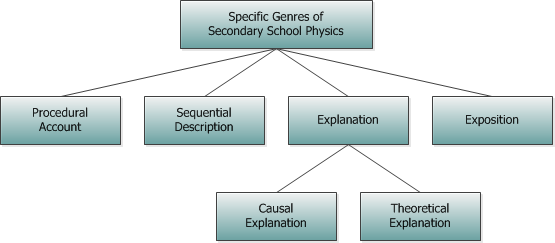Overview
Language can help us construct knowledge and it plays an important role in learning and teaching. Through learning the genres commonly used in Physics - Procedural Account, Sequential Description, Causal Explanation, Theoretical Explanation and Exposition, students should be able to express the physics knowledge and concepts effectively and improve their writing skills.
The specific genres of Secondary School Physics could be classified as follows:

Figure 1. Secondary School Physics specific genres
As shown in figure 1, specific genres of Secondary School Physics can be classified into four types: procedural account, sequential description, explanation and exposition. Amongst the four genres, explanation is the most popular one (see figure 2). Thus we can further classify "explanation" into two types: causal explanation and theoretical explanation.
Procedural Account |
To give accurately an account of a scientific activity including its aim, steps and results or conclusion in order of the significant events. |
Sequential Description |
To describe accurately the processes in a scientific phenomenon in order of their occurrence. |
Explanation |
To explain why and how events or phenomena happen. Explanation in the physics curriculum can be simply sub-divided into causal explanation and theoretical explanation: Causal Explanation: To explain how something occurs or why such phenomenon happens. Usually it details the various stages and explains the causes for the relevant change(s) involved in an event. Theoretical Explanation: To explain why the phenomenon happens with related principle(s), theory(ies) or law(s). It puts special emphasis on the relationship between the observations and physics theories/principles/laws. |
Exposition |
To put forward a position on or an understanding of a subject matter and to provide the supporting analysis, argument or evidence. |
Figure 2: Mapping DSE examination questions to Secondary School Physics genres (for DSE Physics Exam Paper 1B)
| Sample Paper | 2012 Practice Paper | 2012 DSE | 2013 DSE | |||||
|---|---|---|---|---|---|---|---|---|
| Paper 1B | Mark | Paper 1B | Mark | Paper 1B | Mark | Paper 1B | Mark | |
| Physics Genre | 14 Qus | 84 | 14 Qus | 84 | 14 Qus | 84 | 14 Qus | 84 |
| Simple Description | Q5a(ii) |
1 1 1 1 |
Q5a(i) | 1 | Q3a(i) Q6a Q7a(i) |
1* 1* 2* |
||
| Procedural Account | Q9a Q13c Q13d |
5 2 3 |
Q6 Q8c Q11 |
5 3 3 |
Q10 | 7 | Q2a Q5 |
2 5 |
| Sequential Description | Q2c | 2 | Q6a(i) Q6a(ii) |
3 2 |
||||
| Theoretical Explanation | Q1a Q6a(i) |
2 2 |
Q1a(i) Q1c Q4b(ii) |
1 3 1 |
Q2b | 2 | Q1c Q4b Q6b Q6c Q7b(i) Q7c |
1 2 2 2 2 2 |
| Causal Explanation | Q1b Q7 Q8(a) |
2 4 3 |
Q1a(ii) Q1a(iii) Q10a Q10b Q10c |
1 2 2 2 3 |
Q9a Q3b |
2 2 |
Q3b(ii) Q10b |
1 3 |
| Exposition | Q5b Q8c Q9c Q10c Q12b |
2 2 1 2 2 |
Q3d Q5b Q7a Q7c Q5a(iii) |
2 3 2 2 2 |
Q1c Q3a(ii) Q6c Q7b(ii) Q9b(i) Q9b(ii) |
2 2 2 2 2 2 |
Q3b(iii) Q8a(ii) Q10c(ii) |
2 2 3 |
| Marks allocated to writing | 36/84 (42.8%) |
39/84 (46.4%) |
29/84 (34.5%) |
34/84 (40.4%) |
||||
*Only part of it requires writing.

